Hostel de Verdelin
The Hostel de Verdelin, also known as Palazzo Verdelin or the Casa delle Colombe, is a palace in Valletta, Malta. It was built in the mid-17th century for the knight Jean-Jacques de Verdelin, and it is an early example of Baroque architecture in Malta. The palace currently houses a police station and a restaurant.
| Hostel de Verdelin | |
|---|---|
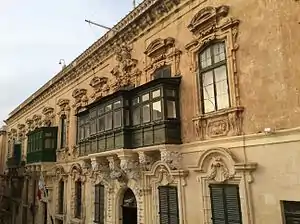 Façade of the Hostel de Verdelin | |
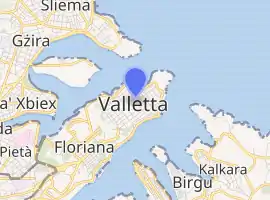
| |
| Alternative names | Palazzo Verdelin Casa delle Colombe |
| General information | |
| Status | Intact |
| Type | Palace |
| Architectural style | Siculo-Spanish Baroque[1] |
| Location | Valletta, Malta |
| Address | Nos. 108–114 Archbishop Street[2] |
| Coordinates | 35°53′58.1″N 14°30′50.4″E |
| Current tenants | Police Department |
| Named for | Jean-Jacques de Verdelin |
| Completed | c. 1650s or 1660s |
| Owner | 12 private owners |
| Technical details | |
| Material | Limestone |
| Floor count | 2 |
| Design and construction | |
| Architect | Francesco Buonamici (attributed) |
History
The Hostel de Verdelin was built in around the 1650s[3] (some sources claim it was built in the 1660s,[4] such as 1662[5] or 1666,[6] but in 1662 the premises were already handed over to Paul de Verdelin from the original owner[7]) for Jean-Jacques de Verdelin, a French knight of the Order of St. John who was the nephew of Hugues Loubenx de Verdalle[4] and who held a number of important positions, including Commander of the Artillery, Auditor of Accounts and Grand Commander.[3] The palace is attributed to the Italian architect Francesco Buonamici, who is sometimes credited for introducing Baroque architecture in Malta.[3]
Following Verdelin's death in 1678, the palace was inherited by his brother Jean-François de Verdelin, who was also a knight. It subsequently became property of the Order, and it was used as a hostel. It was transferred to the government during the French occupation of Malta in 1798,[8] and at this point, two coats of arms on the façade were defaced.[9]
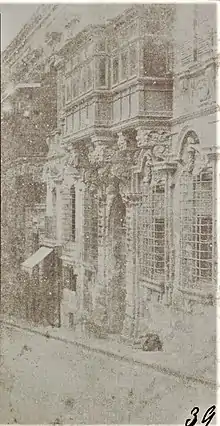
The prominent part of the building seen from St George Square housed the Vicary's Hotel during the British period, which was one of the first hotels in Malta.[10] The building subsequently housed the Civil Service Sports Club.[11][12] For some years it hosted the Circle known as La Giovane Malta.[13]
The other part of the building was leased to the government in 1962. It has since housed the Malta Government Savings Bank and later the Banco di Roma, after which was converted into a police station.[14]
The building's façade was included on the Antiquities List of 1925.[15]
The palace currently belongs to 12 private owners, including Marco Gaffarena, the heirs of Antonio Zammit and the firm B. Tagliaferro and Sons Ltd. The owners have been demanding that the property be vacated since October 2014.[16] Part of the building housed a restaurant called Michael's for a period of about two years around 2014.[11] It now houses a restaurant named Gracy's.[17]
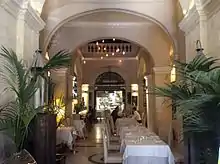
During the Gaffarena scandal in 2015, journalist Caroline Muscat revealed[18] that the government gave Gaffarena €1.65 million in land and cash for his part ownership of another palace in Valletta, the opposition accused the government that it also intended to expropriate the Hotel de Verdelin. These claims were denied by home affairs minister Carmelo Abela,[16] although it was later revealed that the Land Department had sent architects to draw up a valuation report of the palace between February and April 2015.[19]
The palace is scheduled as a Grade 1 national monument by the Malta Environment and Planning Authority.[8] It was restored between September and December 2017.[20]
Architecture
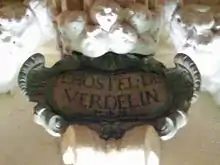
The Hostel de Verdelin is an early example of Baroque architecture in Malta.[21] Its ornate façade has significant influences from the Spanish Baroque style, which is unusual in Malta, where Italian and French Baroque are more common.[8] Its façade is said to be one of the finest in Valletta[22] and described as being an impressive example of artistic fabric in urban Malta.[23] The ornate windows are the centerpiece of the façade.[24] In the 19th century, during the British period, closed timber balconies replaced earlier structure[4] that originally consisted of stone balconies.[25] An artistic interpretation of de Verdelin in form of a painting is found within the building.[26] The palace is the largest of three adjacent buildings which belonged to Verdelin.[7]
See also
Further reading
- Family tree of de Verdelin, in Franc̜ois Alexandre Aubert de La Chesnaye-Desbois, Badier (1774), Dictionnaire de la noblesse, contenant les généalogies, l'histoire & la chronologie des familles nobles de France, l'explication de leur armes, & l'état des grandes terres du royaume ...: On a joint à ce dictionnaire le tableau généalogique, historique, des maisons souveraines de l'Europe, & une notice des familles étrangères, les plus anciennes, les plus nobles & les plus illustres .... Le veuvne Duchesne. p. 751-754.
References
- Atti del Congresso di storia dell'architettura (in Italian). 15. Centro di studi per la storia dell'architettura. 1967. p. 455.
- Protection of antiquities.
- Degiorgio, Stephen (2010). "Palaces and Lodgings of the Knights of St John at Malta". academia.edu. Retrieved 23 March 2016.
- "Valletta – Other Monuments". romeartlover.tripod.com. Archived from the original on 1 April 2016.
- Gaul, Simon (2007). Malta, Gozo and Comino. New Holland Publishers. p. 116. ISBN 1860113656.
- D., Chambry and Trump, David H. (1978). Nagel's Encyclopedia-Guide. Nagel Publishers. p. 115. ISBN 2826307118, ISBN 9782826307112.
- Denaro, Victor F. (1961). "More houses in Valletta" (PDF). Melita Historica. 3 (2): 5–6. Archived from the original (PDF) on 23 March 2016.
- "One World – Protecting the most significant buildings, monuments and features of Valletta (97)". Times of Malta. 14 March 2009. Archived from the original on 23 March 2016.
- "About us". Michael's. Archived from the original on 24 June 2015.
- Cassar Pullicino, Joseph (1981). "Some 19th century hotels in Malta" (PDF). Melita Historica. 8 (2): 109–124.
- "The Renaissance of Valletta". Times of Malta. 3 December 2015. Archived from the original on 23 March 2016.
- Mallia-Milanes, Victor (1988). The British colonial experience, 1800-1964: the impact on Maltese society. Mireva Publications. p. 278. ISBN 1870579011, ISBN 9781870579018.
- "History" (PDF). melitensiawth.com. Retrieved 28 January 2020.
- "Property owners demand keys of Valletta police station". Timesofmalta.com. 22 August 1940. Retrieved 28 January 2020.
- "Protection of Antiquities Regulations 21st November, 1932 Government Notice 402 of 1932, as Amended by Government Notices 127 of 1935 and 338 of 1939". Malta Environment and Planning Authority. Archived from the original on 20 April 2016.
- Vella, Matthew (11 August 2015). "Gaffarena in company of others who demanded Verdelin eviction in 2014". Malta Today. Archived from the original on 30 September 2015.
- https://timesofmalta.com/articles/view/cocktails-fit-for-a-king-at-palazzo-de-verdelin.758920
- "Caroline Muscat to lead PN election campaign". Times of Malta. 12 October 2016. Archived from the original on 13 October 2016.
- Camilleri, Ivan (17 August 2015). "Government architects sent to make palazzo valuation". Times of Malta. Archived from the original on 22 December 2015.
- Grech, Denise (27 December 2017). "Palazzo Verdelin restored ahead of Valletta 2018". Times of Malta. Archived from the original on 27 December 2017.
- Gaul, Simon (2007). Malta, Gozo and Comino. New Holland Publishers. p. 325. ISBN 1860113656.
- De Piro, Nicholas (1997). Valletta: A City Built by Gentlemen for Gentlemen. Miranda Publications. p. 110. ISBN 9990985006, ISBN 9789990985009.
- Pickard, Robert (ed.) (2012). Policy and Law in Heritage Conservation. Spon Press. London and New York. p. 234. ISBN 1135158037, ISBN 9781135158033.
- Bugeja, Lino; Buhagiar, Mario; Fiorin, Stanley (1993). Artistic, architectural and ecclesiastical aspects. Malta University Services. p. 450. ISBN 9990944024. ISBN 9789990944020.
- Tanti, Christine. St. George's Square. maltain360.com. Retrieved 19 July 2016.
- Paolo Bonavia (1880) A Guide to the Maltese Islands. Digitized by Godwin, George Nelson (2007). p. 102.
External links
![]() Media related to Hostel de Verdelin at Wikimedia Commons
Media related to Hostel de Verdelin at Wikimedia Commons
